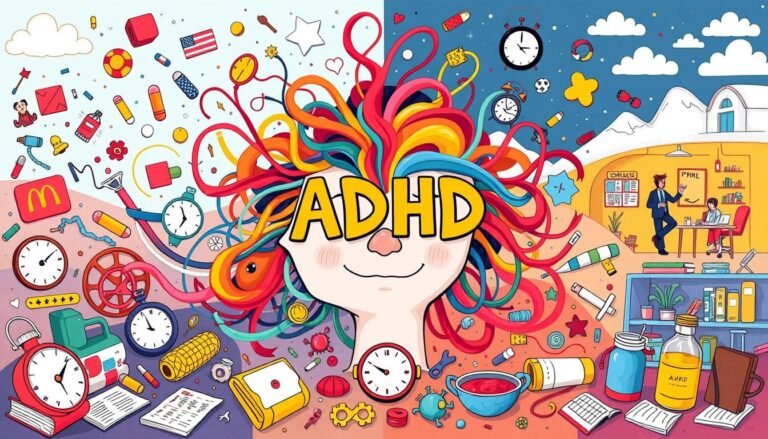Addressing Burnout and Stress in the Irish Corporate Environment
Anne O’Leary was on top in Dublin but felt the burn. Her work success was clouded by stress and exhaustion. Many in Ireland’s business world face this burnout, feeling emotionally empty and overwhelmed.
Today, the WHO labels burnout an ‘occupational phenomenon.’ In Ireland, it’s not just a mood killer. The toll is financial, with billions lost due to stress-related sick days. This calls for serious action on stress and burnout at work.
Spotting burnout triggers is crucial for mental health at work. High demands, unclear roles, and tough team situations are big triggers. Left unmanaged, these issues can lead to even more serious mental health problems.
Gladly, companies like GitLab are making changes. They’re into flexible work and smart workload handling, paving the way for better mental health at work. Other Irish companies can follow suit to make work-life better for everyone.
Key Takeaways
- Burnout is officially classified by WHO as an ‘occupational phenomenon’ resulting from chronic workplace stress.
- Chronic workplace stress is characterized by over-engagement, hyperactivity, and anxiety, evolving into burnout which entails disengagement and emotional detachment.
- Major causes of burnout include excessive workload, lack of control, unclear job expectations, and dysfunctional team dynamics.
- Burnout symptoms include exhaustion, hopelessness, lack of work-life balance, and emotional numbness, leading to potential severe mental health issues.
- Effective strategies to manage burnout include setting boundaries, demanding less of oneself, building resilience, and establishing a work-life balance.
- Prominent companies like GitLab are taking proactive measures like flexible work environments and strong workload management to prevent burnout and support employee well-being.
- Addressing burnout effectively enhances overall employee well-being and contributes positively to the economic health of businesses.
Understanding Burnout and Stress
Burnout and stress are big issues in today’s work world. To tackle them, we need to really know what they are, why they happen, and how they affect us.
Defining Burnout
The World Health Organization calls burnout a big problem caused by too much chronic workplace stress. It shows up in feelings like being just exhausted, distant from work, or suddenly very negative. Being less effective at work is a big sign of burnout. Enda O’Doherty says being tired, feeling negative, and not working well are common in burnout. It stresses the importance of handling stress in the workplace to avoid burnout.
Causes of Stress
Many things at work can cause stress. These include too much work, not being able to make decisions, and not getting enough rewards. Bad relationships at work, unclear job roles, and not balancing work and life properly are also major stressors. A 2018 Eurofound report found that over 50% of workers face burnout. This often happens when working more than 60 hours a week. Tools like the Maslach Burnout Inventory help measure this stress.
Research also points to genes playing a role in how we handle stress. For example, people with certain genes might feel more stressed. Our childhood and the society we live in also impact our stress levels. Mental health support and wellness programs are critical in handling these stresses. Companies should offer these programs and screen job candidates to better manage stress and prevent burnout.
Common Causes of Burnout in Irish Corporate Culture
In the Irish work world, burnout is a big issue with many causes. This part will look into why employees get burnt out.
Excessive Workload
Too much work is a top cause of burnout. A study found that 23% of Irish workers face burnout because of this. They struggle with high workplace demands and unrealistic deadlines, leading to constant tiredness and low joy from work.
About 64% of Irish workers say their stress comes from heavy workloads and tight schedules. When help isn’t there, tasks seem impossible. This makes employees feel strained and pushed too far.
Lack of Control
Not being able to control their work contributes to burnout for many. Around 39% of Irish workers suffer from burnout because they feel their job lacks autonomy. They need to have a say and be part of the decision-making to stay energized.
Without control, they feel unimportant, which adds to their stress. This is more common in places with lots of demands but little freedom to act.
Insufficient Reward
Getting recognized is very important to avoid burnout. When people don’t feel valued through good pay, promotions, or simple acknowledgments, their morale drops. In Ireland, half of burnout cases are linked to lack of recognition or reward.
Not praising or rewarding workers for their hard work makes them feel unappreciated and demotivated. It can lead to ongoing stress and burnout.
How Burnout Affects Employee Well-being
Burnout really hits hard, messing with how employees feel and act. It brings on a lot of physical and emotional symptoms. These can really lower life quality and how well someone does their job. Companies should learn about these effects. This knowledge can help them make better plans to fight burnout and better their workers’ health.
Physical Symptoms
Burnout can show up in the body with many signs. Feeling constantly tired, even after lots of sleep, is a big one. It’s called chronic fatigue. Not getting enough sleep makes this worse. This leads to a drop in job quality. There are other signs too, like getting sick often, headaches, and stomach troubles.
Emotional Symptoms
Burnout does quite a number on people’s hearts and minds, too. They might find themselves easily irritated, anxious, or sad. Juggling too many things can make them feel like they’re swimming in work, feeling like they’re not doing well, and wanting to pull away. This can really lower how much they like their job and their drive to do well. It forms a loop of doing less and caring less, showing the huge need for good workplace health programs.
Ireland faces a big burnout problem, losing 11.7 million workdays a year to it. The local culture often pushes people to work hard, making it tough to spot and deal with burnout signs. But, creating a work environment that supports and encourages talking about these issues can really help. It would make for a happier, more efficient workplace.
The Impact of Burnout on Workplace Mental Health
Burnout’s effect on workplace mental health is key for companies that want to keep their workers engaged. When employees face burnout, they deal with many tough challenges. These include chronic fatigue, sleep problems, feeling down, and being anxious.
Chronic Fatigue and Insomnia
About two-thirds of people in a study felt exhausted due to burnout. This feeling was especially strong during the pandemic. As a result, many couldn’t sleep well. This made them less productive and more likely to miss work.
What’s worse, most people reported getting even more work during COVID-19. This made their tiredness and sleep problems worse.
Depression and Anxiety
Burnout doesn’t just hurt the body. It deeply affects workers’ minds, too. Many felt drained from their job and some were stressed from taking care of others. More than half were overwhelmed by work, leading to feelings of depression and anxiety.
These mental struggles can make the workplace less effective and cause more absent days. The high number of women facing these issues shows we need to focus on mental health support in the workplace. This includes providing tools to lower stress and prevent burnout.
Companies should work on these issues to keep their employees healthy and productive. By creating a supportive job environment and offering mental health help, businesses can fight burnout. This will also help improve the well-being of their teams.
Why Burnout Often Goes Unrecognized
Understanding burnout is hard for many, thanks to our culture and society. In Irish workplaces, there’s a big focus on work and not much on taking care of yourself. This can make it tough for people to see they’re burning out, especially when stress is seen as normal.
A recent study found that 92% of Irish charity workers know someone who’s experienced burnout. Despite this, the issue is often ignored. Many avoid talking about mental health because of the shame. This silence harms workers’ mental health and safety at work.
Many things stop us from noticing burnout. First, we often don’t know the signs, like feeling tired and overwhelmed. People think these are just part of a tough job. Also, the shame around mental health makes it hard for folks to ask for help.
In the charity sector, places that really rely on their workers, many don’t give bonuses. They believe in the power of their team, even though half are struggling to keep their staff. Not getting enough pay or recognition puts a heavy burden on these workers, making burnout worse.
Burnout hurts both the person and their workplace. It causes more time off and less work getting done. Plus, the shame around mental health makes it hard for those suffering to get help. To stop this, we need to support open talks about mental health. This is crucial for making a better, safer place to work for everyone.
Effective Stress Management Techniques
Nearly 80% of Irish workers feel the weight of workplace stress. This strain can show through feeling overwhelmed, struggling to focus, being easily irritated, and feeling anxious. To fight back, it’s key to use effective stress management techniques. These methods include handling your time well, practicing mindfulness and meditation, and getting moving.
Time Management Skills
Learning to manage your time is vital for dealing with stress. It means you should set achievable targets, decide what’s most important, and not put off tasks. Good time management keeps you on track and cuts down the stress that comes from feeling like you have too much to do. Sadly, just 43% of employees in Ireland make time for these helpful practices. Making lists and breaking big tasks into smaller ones can also help you get more done in a day.
Mindfulness and Meditation
Mindfulness and meditation are powerful stress busters. They teach you to focus on the moment, control your thoughts, and decrease your anxiety. These practices are known for their positive effect on mental health and are backed by science. Many workers have seen lower anxiety and better focus by adding short meditation sessions to their daily activities.
Physical Activity
Getting regular exercise is a top way to manage stress. When you work out, your body releases endorphins, which help you feel good and fight stress. This not only improves your health but also your mental strength, making you better able to cope with the stress of work. Even small things like walking more, biking, or choosing the stairs can have a big impact. Plus, inviting coworkers to join in can create a healthier and more supportive work environment.
Implementing Corporate Wellness Programs
In Ireland’s changing work scene, focusing on staff wellness is key. 96% of businesses there now have employee health programs, showing their importance. However, just 1 in 2 companies have a full strategy for well-being, leaving much to be desired.
Corporate wellness programs cover various activities to help employees stay healthy. This includes mental health workshops, private counseling, fitness programs, and support for stress. Such efforts help reduce burnout and stress, making for a happier and more dedicated team.
Mental health is a big worry for 66% of Irish employers, while 81% of workers look for jobs with strong mental health support. And nearly 40% of employers know worker burnout is serious. They also see the work environment as a risk to well-being. Tackling these issues with solid stress management is crucial for a great workplace.
71% of employers name balancing work and life as their top concern. But, the good news is, tweaking your focus by just 4% can up profits by 1% and cut staff leaving by 1%. This clearly shows the business benefits of supporting your team’s health and happiness.
The pandemic took a toll on many, with 61% of Americans noticing weight changes. This underlines the importance of wellness programs that care for both body and mind.
A vast majority, 94%, say they’d stick with supportive companies. Still, over half of businesses feel leaders don’t pay enough attention to well-being. Creating valuable programs needs strong leaders who are committed.
Successful wellness programs should offer more than just health tests. They should include things like mental health workshops to really aid employees’ well-being. This approach will help attract and retain a loyal staff.
Benefits of Work-Life Balance Strategies
Work-life balance strategies help keep employees happy and engaged. Flexible working arrangements like working from home or changing work hours can lower stress and prevent burnout. This makes workers happier and more likely to succeed in their careers, thanks to a supportive and flexible work environment.
Many employees love flexible work options. In 2019, 81% of workers saw it as key for work-life balance. Letting them adjust their work schedules around personal needs boosts their happiness and job dedication.
Supporting staff in achieving better work-life balance lowers quitting rates. Offering perks like gym discounts, yoga, and mental health help makes employees stay. This keeps talented people around for longer.
Poor mental health costs the economy billions due to missed work. But, good work-life balance and flexible working arrangements can help. They improve everyone’s well-being and reduce these costs.
Parents struggle more without supportive employers. Companies can offer part-time work or job sharing to help. This aids in reducing stress and boosting parents’ job performance.
Work-life balance strategies also benefit mental health. They lower stress and burnout. This makes for a happier and more engaged workforce which can benefit everyone.
Finally, separating work and personal time helps employees. They come back refreshed and more motivated. As a result, they are better able to progress in their careers, which helps the whole business.
Mindfulness Practices in the Workplace
Introducing mindfulness at work is key to a great and busy workplace. Big names like Google, Nike, and Apple show how these practices lower stress. They also boost how happy, creative, and loyal employees are.
Meditation Sessions
Having meditation for stress relief at work really helps. It gets employees into a calm, focused state. Doing this means people are less drained by work and can better bounce back from stress. This makes a major improvement in how focused and effective a team is.
Breathing Exercises
Teaching breathing techniques for employees can easily cut down on stress. These practices calm the body right away and improve clear thinking over time. It’s a good idea to have short breath sessions during the day. This builds overall workplace mindfulness and better mental health.
Role of Leadership in Burnout Prevention
Good leaders are key in keeping workers from burning out. They show the way with healthy habits. They also give help and make sure the work culture is supportive.
Modeling Healthy Behaviors
Managers should be role models for their teams. They set achievable goals and make sure to take care of themselves. They balance work and personal life well. This can help their teams avoid burnout. A study by McKinsey showed over 50% of women in management are burned out. This shows why leaders should manage stress well themselves.
Providing Resources and Support
Leaders should support their teams with mental health days and ways to relax. According to Forbes, many Americans don’t use all their vacation days. This can lead to too much work and stress. So, encouraging time off and providing good mental health services is important.
Good leaders also make sure everyone has a fair share of the work. This prevents anyone from getting overloaded. When leaders focus on managing stress well, it makes a big difference. It helps boost everyone’s spirit and makes the company better overall.
Conclusion
Addressing burnout and stress is key in Irish workplaces. This promotes a workforce that is strong and mentally healthy. The World Health Organization declared burnout a medical issue in 2019. The COVID-19 pandemic has made stress at work worse. By taking early steps to fight burnout, companies can support mental health and make work more rewarding.
Recognizing the signs of burnout is crucial. These signs include feeling down, not caring at work, and not being happy. Using tools like Performance Management Software from Advance Systems can help managers spot stress early. It’s also important to let workers take a break or vacation when they need it. Talking openly about work goals is a good way to reduce burnout in Ireland.
Being fair is important too. This means giving workers a fair review, a fair schedule, and fair pay. It’s been seen that too much stress reduces how well people work. This can harm the company. By focusing on fairness, Irish businesses can help their staff stay healthier and stronger. This prepares them for lasting success and health in their work.
FAQ
What is burnout?
Burnout, as defined by the WHO, is a result of chronic work stress. This causes emotional exhaustion and detachment from work. It also leads to feeling less effective in your job. Burnout is similar to stress but not quite the same.
What are the common causes of burnout in the Irish corporate environment?
In Ireland’s corporate setting, burnout often comes from a heavy workload. This is because of high expectations and tight deadlines. Employees also face low control over their work and might not feel adequately rewarded. Rewards can mean both pay and recognition.
How does burnout impact employee well-being?
Burnout can hurt employees in many ways. They might feel very tired all the time or have trouble sleeping. They can also get sick often or have headaches. On an emotional level, they might become more irritable, anxious, or depressed. These issues often end up affecting how well they can do their jobs.
Why does burnout often go unrecognized in the workplace?
In Ireland, burnout might be missed because of strong work ethics and a focus on getting things done. Stress is often seen as normal. It’s hard for people to talk about mental health problems because of the shame often attached to them. Plus, not everyone knows the signs of burnout. This can all make the problem worse.
What effective stress management techniques can reduce burnout?
Good time management and setting tasks in order can help a lot. Mindfulness and meditation can also be effective. Plus, regular exercise keeps your body and mind healthy. These techniques help employees bounce back from stress and build their strength.
What are corporate wellness programs, and how can they help?
In Ireland, these programs may offer workshops on being healthy and fit. They often give access to counseling and mental health support. Plus, they encourage physical activities. The goal is to reduce stress and make employees feel good.
How do work-life balance strategies benefit employees?
Strategies like working remotely or having flexible hours can really help. They let employees take care of personal matters and relax. This boosts their happiness and makes them less likely to leave their jobs. It’s a great way to avoid burnout.
What role does mindfulness in the workplace play in reducing stress?
Mindfulness practices, like meditation, can reduce stress at work. These techniques help employees relax and stay focused. They create a peaceful and positive atmosphere in the office.
How can leadership prevent burnout in the workplace?
Good leaders are key in keeping burnout at bay. They should show how to stay healthy and support their team. A positive culture, where hard work is recognized, is vital. Leaders who prioritize well-being help keep people motivated and the company successful.
What are the signs and symptoms of burnout?
If you’re burnt out, you might always feel tired, have trouble sleeping, and get easily upset. You can also feel like you’re failing, want to avoid work, or don’t do your job as well as before. It’s a mix of physical and emotional signs that show something isn’t right.
Source Links
- Managing Burnout in the Workplace – Irish Life Health
- Identifying & Addressing Burnout
- Burnout on the frontline: the impact of COVID-19 on emergency department staff wellbeing
- Burnout and Stress at Work – All Your Questions Answered — Work Well Community
- Understanding Burnout Culture: 10 Ways Leaders Can Reduce Workplace Stress
- Professional Burnout as a Mediator in the Relationship Between Pandemic-Related Stress and Social Care Workers’ Mental Health
- Understanding Burnout vs. Stress in the Workplace
- Nurturing Well-being in the Irish Workplace: Strategies for Managing Work Related Stress – Salutem Advisory
- Bullying and Work-Related Stress in the Irish Workplace
- Overcoming Burnout in Ireland
- Nurturing Well-being in the Irish Workplace: Strategies for Managing Work Related Stress
- Addressing Workplace Burnout and Stress: A Comprehensive Guide – HRHQ Ireland’s No1 Choice for HR News & Resources
- Burnout in mental health services in Ireland during the COVID-19 pandemic
- The effects of different types of organisational workplace mental health interventions on mental health and wellbeing in healthcare workers: a systematic review – International Archives of Occupational and Environmental Health
- Prevalence of burnout among healthcare professionals: a survey at fort portal regional referral hospital – npj Mental Health Research
- On National Workplace Wellbeing Day (28 April), Charity Workers Face Increasing Pressures and Inadequate Pay | The Wheel
- The Prevalence and Cause(s) of Burnout Among Applied Psychologists: A Systematic Review
- Occupational burnout
- Stress Management Techniques for Irish Professionals.
- Coping with Workplace Stress in Ireland | It’s On Mens Blog
- Stress Management: Techniques & Strategies to Deal with Stress
- Aon survey reveals ‘work-life’ balance is the top wellbeing concern for Irish employers
- How organizations can support workplace wellbeing.
- Employee Wellness Programs: Building Company Culture
- Original research: Workplace interventions to improve well-being and reduce burnout for nurses, physicians and allied healthcare professionals: a systematic review
- Employee work life balance: What it is & the benefits you should be offering
- OECD Better Life Index
- Corporate Mindfulness and Wellness
- Burnout
- Leadership and Burnout: How to Avoid Burnout as a Leader
- Factors Contributing to Clinician Burnout and Professional Well-Being – Taking Action Against Clinician Burnout
- How to Prevent Employee Burnout
- Identifying Burnout and Preventing It in Your Workplace | Advance Systems Ireland
- Burnout in mental health services in Ireland during the COVID-19 pandemic | BJPsych Open | Cambridge Core
- Physician burnout and symptom of anxiety and depression: Burnout in Consultant Doctors in Ireland Study (BICDIS)








